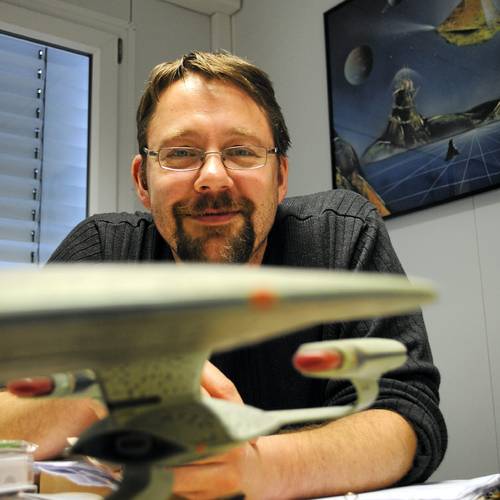Alexander Szameit
University of Rostock, GermanyFor groundbreaking contributions to photonic simulations of quantum and solid state phenomena.

Alexander Szameit finds inspiration in pop culture, primarily science fiction movies and Star Trek. As a child, he was drawn to the American television series depicting space exploration to find new worlds and make discoveries. Alexander’s research today is fundamental and related to the mission of Star Trek’s USS Enterprise. He remembers seeing futuristic technologies on the show and wondering if those things might work in real life. As it turns out, the technology depicted in the show was perhaps not too far-fetched. He can now do many of these things in his lab, like pulling and pushing things with light and creating a glass chip that acts like a computer.
Alexander focuses primarily on convincing light to act in ways it wouldn’t naturally. For example, he can get light to travel around a corner or move through a 7-dimensional pyramid. His lab focuses on quantum simulations, sharing, “We use light to calculate things, we use light to compute things, we use light to simulate things like electrons in a solid and elementary particles and free space, things that are hard to do in a true experiment.” With this kind of system, the possibilities are almost endless.
Throughout his career, Alexander has had a nonlinear research progression, following his interests and curiosities. After completing a postdoc in Israel, he returned to his native Germany to start his first research group. He reflects, “Ideas just come. It's not that one can plan to have ideas. And then one says, ‘Okay, this is exciting, so let's do it, and this is exciting, so let's do it.’ This caused our topics to grow broader and broader and broader.” Alexander also shares that it is impossible to plan research too far in advance because fundamental science, by definition, pushes the boundaries of what is possible. As more possibilities open, new research areas that would have never been conceived previously emerge.
Fundamental research, of course, comes with challenges. First, it can be tough to find a completely new idea. Alexander says that “partially new” is easy; new but boring is also easy. However, finding an entirely original and exciting idea is very difficult because so much research has already been done and is actively developing in the field. He encourages everyone in his group to think outside the box and envision what might be possible. Once the idea is formed, the next obstacle is understanding, which is quickly followed by creating an experiment. Trying to physicalize an abstract concept can be very difficult, but with creativity, it is possible. The final challenge is technology. Alexander shares that sometimes, the technology simply isn’t available for his lab's experiments. Again, creativity and perseverance are the answers.
Some of Alexander’s favorite scientists were highly creative, confident, and steadfast in their discoveries. Dan Shechtman, who discovered the quasicrystal, and Shuji Nakamura, who created the blue laser diode, were doubted by the scientific community when they first presented their results. Prior to their work, it seemed like common knowledge that blue laser diodes and quasicrystals were impossible, and many scientists were dismissive of the discoveries. In fact, in the case of the quasicrystal, Shechtman was not the first to discover them, but previous observers doubted their results and didn’t share those findings. Shechtman, though, forged ahead. Alexander admires this persistence and tenacity in the face of doubt.
Another influential scientist for Alexander was his postdoctoral supervisor, Moti Segev, at the Technion, Israel. Moti was Alexander’s first true mentor and set the example for leading students effectively. He allowed Alexander enough freedom to explore without intrusion but was always available to help offer advice. Today, Alexander follows the same procedure and adds, “The freedom my students want and the freedom they need are often different.” The role of a great mentor is to identify both and gently guide their students in the right direction.
The field of photonics is rapidly growing, and quantum is starting to be a mainstream topic. Alexander shares that “Quantum Technologies” was a contradiction when he was in school. Now, there are whole degrees in quantum. Notably, the public supports this growing field as well. As part of his work, he gets to talk to people outside of science and explain why his work matters. Often, he shares, the taxpayers agree! “They appreciate what we are doing, and this is usually a very good sign when the people who pay their money so that we can do our work say, ‘Yes, it's good that you do that.’” It helps that Alexander’s enthusiasm and passion for his research shine through, and anyone who talks to him would likely feel inspired.
Photo Credit: Alexander Szameit
Profile written by Samantha Hornback
